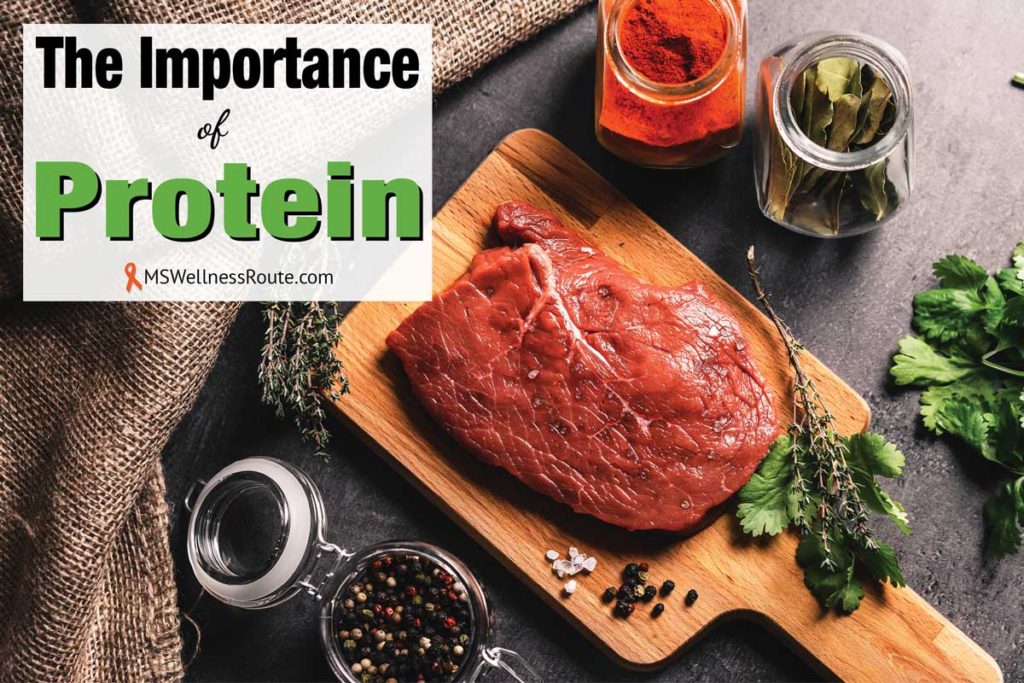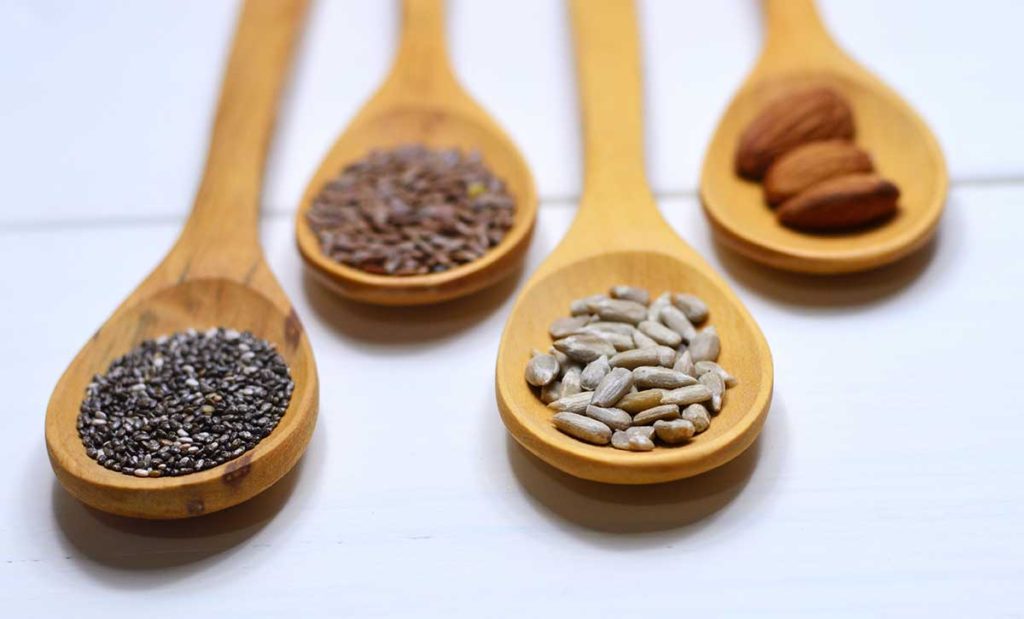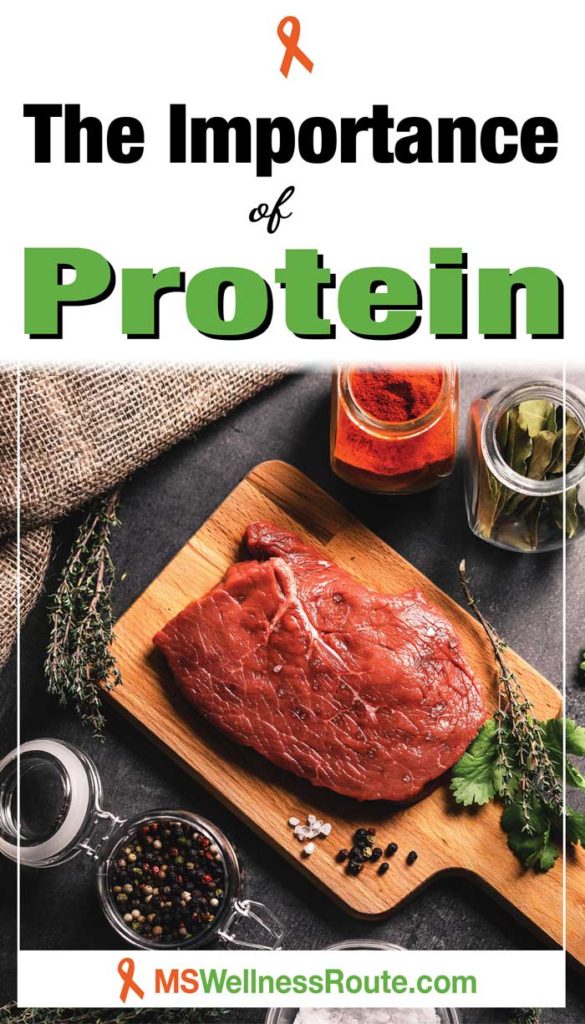Last Updated on January 30, 2025 by Cathy

Protein is a necessary nutrient that repairs cells and makes new ones. Every cell in your body contains proteins. It maintains lean muscle mass, stabilizes blood sugar, and boosts your immune system.
It also supports a healthy central nervous system. Proteins move nutrients throughout your body and store them when you need them. Proteins are a macronutrient along with carbohydrates and fats. Your body needs these nutrients in larger amounts in order to function properly.
Micronutrients include fiber, minerals, phytonutrients (colorful fruits and vegetables), and vitamins. Macronutrients, micronutrients, and water help your body to thrive.
How Protein Works
As you digest food it mixes with acids and enzymes in your stomach to help break it down. The carbohydrates, both simple sugars, and complex starches break it down into glucose. After it’s absorbed it is then released into the bloodstream. Once in the bloodstream, it’s used immediately for energy or stored for later use.
Protein breaks down more slowly so it is a longer-lasting form of energy. The body uses protein when there aren’t enough carbohydrates.
How much protein should I eat?

Adults should consume between 10% and 35% of their total calories from protein. For this, you would have to keep track of your calories for the day. The Corometer app is a free helpful tool you can download on your smartphone. It not only counts calories but it tracks your nutrition including proteins.
Most Americans eat too much protein, about twice the recommended amount. Then there are people on a strict diet who could end up not eating enough protein. Not eating enough protein can make you lose muscle mass, which affects your balance, and slows your metabolism. Knowing the importance of how much protein you should be eating is key to your health.
You can use this handy calculator below to find the range of proteins you should be eating:
Calculator courtesy of verywellfit.com
Once you calculate your calories, multiply that number by 10% and 35% to find your range. For example, if you consume 2,000 calories each day you need to include 200 to 700 calories from protein.
An easier way is to eat 3 to 4 ounces of protein at each meal. That equals about the size of your palm. This isn’t very accurate but it’s a start. Just remember, the more active you are during the day, the more protein your body needs.
Sources of Protein

Image by Freepik
Protein comes in many different forms, you can get it in both animal and plant foods. What you eat will make a tremendous difference in your health. Avoid highly processed proteins such as deli meats and hot dogs. They raise inflammation which causes heart disease, obesity, and autoimmune diseases.
Instead, choose protein from clean sources. If possible choose 100% organic from both animal and plant food sources to avoid toxins.
“Eat animals that have themselves been well fed.” – Michael Pollan
Animal protein supplies you with protein and vitamin B12. This is critical for maintaining a healthy myelin sheath (protective coating around nerves). Multiple sclerosis (MS) attacks and destroys the myelin leading to disabilities.
Good sources of protein:
- Wild-caught fish
- Pastured-raised poultry*
- Grass-fed meats and organ meats
- Artichokes
- Avocados
- Bok choy
- Broccoli
- Cauliflower
- Nuts and seeds
- Brussels sprouts
*It is best to avoid eggs while you are trying to heal. Dr. Terry Wahls, the author of The Wahls Protocol, found people with MS tend to have problems eating eggs.
Soy is also a good source of protein. However, most soy grown in the U.S. is a GMO, so it is best to avoid all soy. Most people with MS have poor gut bacteria so this is a good option.
Milk is another good source of protein. But, researchers found women with MS who drank 3 or more cups a day of milk had more exacerbations. A protein (casein) in cow’s milk triggers inflammation that damages myelin.
Avoid all milk products including whey.
“Studies indicate that MS rates are elevated in populations where a lot of cow’s milk is consumed.” – Stefanie Kürten, Institute of Anatomy at University Hospital Bonn
Meat consumption is a good source of protein. However, a 2017 study found MS patients that ate a high-vegetable/low-protein diet had fewer relapses. If you avoid or limit meat there’s no need to skip out on the importance of protein. There are plenty of plant-based proteins to fill your needs.
Vegetables High in Protein
When you think of protein, you might think of steak or chicken first. However, there are plenty of protein-rich plant-based sources. Besides beans and lentils, there are many options to choose from to keep your protein level up.
Vegetables high in protein per one cup (highest to lowest):
- Chickpeas – 10.7 grams
- Green peas – 8 grams
- Avocado – 3 grams
- Brussels sprouts – 3 grams
- Asparagus – 2.9 grams
- Broccoli – 2.5 grams
Nuts and Seeds

Nuts and seeds are also excellent sources of protein plus they include healthy fats. They also include fiber, vitamins, and key minerals like magnesium, selenium, and zinc. Make sure they are raw and not covered with oils, salt, or sugar.
It is best to soak the nuts and seeds before consuming them so they are easier to digest. Roasting them in a healthy oil with your favorite herbs makes them a great snack or an addition to your meals.
Nuts and seeds high in protein per serving (highest to lowest):
- Sunflower seeds – 14.5 grams per half cup
- Almonds – 13.5 grams per half cup
- Pumpkin seeds – 13.5 grams per half cup
- Pistachios – 12.5 grams per half cup
- Cashews – 12 grams per half cup
- Hemp seeds – 10 grams per 3 tablespoons
- Brazil nuts – 9.5 grams per half cup
- Pine nuts – 9 grams per half cup
- Chia seeds – 6 grams per 3 tablespoons
- Walnuts – 6 grams per half cup
- Macadamia nuts – 5.5 grams per half cup
Eat a moderate amount of nuts and seeds because they can be high in carbohydrates. Infections such as mycotoxins, SIBO, and yeast overgrowth feed on sugar (carbs). Almonds, Brazil nuts, and walnuts are the lowest in carbs.
Cashews are one of the highest in carbs plus they are high in mold. If you have a high level of mycotoxins you should avoid cashews along with pistachios.
Nut butter is another good protein source, make sure there isn’t any added sugar.
Quick Links To Information In This Post:
How To Go Dairy Free
Are Mycotoxins Holding You Back From Healing?
What Is SIBO?
What Is Candida Albicans?
Protein Powder
Protein powders are very popular among health-conscious people. There are many options to choose from making it difficult to know which one is the best. Protein powders come in either animal or plant foods such as dairy, eggs, peas, or rice.
Here are some popular protein powders available:
- Casein protein is definitely one to avoid.
- Egg protein should be avoided.
- Hemp protein is a plant-based protein rich in amino acids and healthy fats.
- Mixed plant protein is just what it sounds, it could include beans, grains, nuts, and tofu.
- Pea protein is a high-fiber protein made from yellow split peas. Although peas are a legume, they are still in seed form so this should be fine to consume.
- Rice protein is made from rice or brown rice, rice is a grain. Depending on what diet you follow you, like the Paleo diet, may need to avoid it.
- Whey protein is a popular choice among athletes but whey comes from milk so you should avoid it.
Always read the ingredients. Watch for ingredients to avoid such as additives and fillers. You should always get your nutrients from food first. Use protein powders only when you struggle to meet your protein needs.
The protein powder I use is Vital Proteins Collagen Peptides. Another good option is BulkSupplements Paleo Beef Isolate.
The Importance of Protein
Protein and amino acids are the building blocks of cellular health to protect myelin. In a 2007 study, researchers found protein could possibly reverse the damage of MS. When living with MS the importance of protein helps to build and repair tissue.
Eating snacks such as beef sticks or chopped nuts will give you a quick boost of energy. Avoid eating a high-carb diet to keep your blood sugar level. Sugar increases insulin levels, lowers HDL (the good cholesterol), and feeds infections.
Since protein plays a vital role in bodily functions, you should include it with every meal and snack. Yes, protein is an important nutrient but so are other equally important nutrients. A well-balanced diet should include healthy proteins, fats, carbohydrates, and micronutrients.
Knowing the importance of all nutrients including protein will help your body overcome MS. Eat a well-balanced diet, drink plenty of filtered water, get enough sleep, exercise, and lower your stress.
You can do this!

Free Wellness Library!
Subscribe for free and I’ll send you the password to my secret library filled with many printables for your wellness journey.
Want to remember this health tip? Pin it to your Pinterest board!

Resources:
https://www.sciencedaily.com/releases/2022/03/220301131110.htm
https://www.verywellfit.com/how-to-calculate-how-much-protein-you-need-3955709
Photo by Ali Smith, Estudio Gourmet, and Miguel Á. Padriñán from Pexels.
The Importance of Protein





